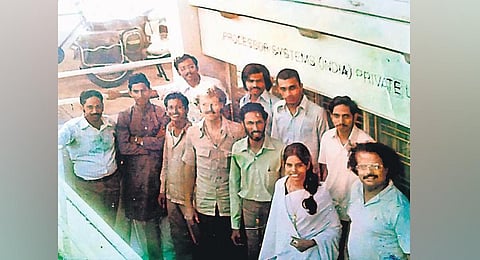

BENGALURU: Bengaluru’s sobriquet as the Silicon Valley of India has its foundations going back to early 1970s when 50 years ago, in a basement on Richmond Road, one of the first computer companies in India - Processor Systems (India) Pvt Ltd (PSI) - was born.
Founded on December 29, 1973, PSI, now known as ProcSys, will celebrate its golden jubilee next week. Registered in Kerala, the company opened an office in the basement of Classic Building on Richmond Road.
The story of PSI began with its three founder directors - Late VK Ravindran (Ravi), who gave up an opportunity to work with Bell Labs in the US and came back to India to start an IT company here, which would also employ Indian engineers, who had limited options in the IT sector then. His brother Late VK Harindran (Hari), who was then working with Toshiba Anand in Kerala, resigned from his job to establish the company. The third member, Vinay Deshpande. also a Stanford graduate like Ravi, joined them to set up PSI in Bengaluru.
PSI was registered in Ernakulam on December 29, 1973 with its office at ‘Nauka’, the brothers’ parental home. After registration, PSI opened an office in Bengaluru. “The idea was to produce computers with microprocessors for every household in India. The timing was right with the exit of IBM from India and the strict restrictions for the establishment of IT companies. PSI had a head start. Ravi could foresee the needs of the industry.
He was a visionary ahead of his time and would say, ‘I am the processor, the solution to all the problems.’ So, the company was called Processor Systems India,” recalled Nandana Ishbiliya, executive chairman, ProcSys and wife of late Harindran.
Speaking about the times then, she said that in the 1970s, after the Janata government sent Coca-cola and other multinational companies packing, IBM left. Indians only had access to computers from the early 50s and 60s, which had been long phased out. In the West, the microprocessor revolution was taking off. India could not depend on the US for technology as the US had embargoed anything to do with computers to India.
Education to business
“So, a group of officials in the Department of Electronics supported PSI to develop indigenous equivalents of PDP 11 DEC machines. This meant that the system had to be recreated with bit-slice architecture to emulate the PDP instruction set, to be able to run the existing operating systems, compilers and interpreters. PSI built its version of the minicomputer which was the PSI OMNI which wasn’t envisioned to be a commercial computer. It was solely for defence purposes. Then with the inclusion of support for FORTRAN 4, they became useful for educational computing and then as business computers,” said Nandana.
Though PSI was a small company, it attracted the brightest minds in the industry. ProcSys has come a long way since its inception; from when funds were not easy to come by because banks didn’t understand the industry and engineers were carrying the machines in ‘steel and wooden dabbas’ to their clients’ offices and spending time convincing them as no one was even familiar with the concept of a computer. Now ProcSys provides a full range of services related to embedded product engineering across a diverse set of Industry domains.